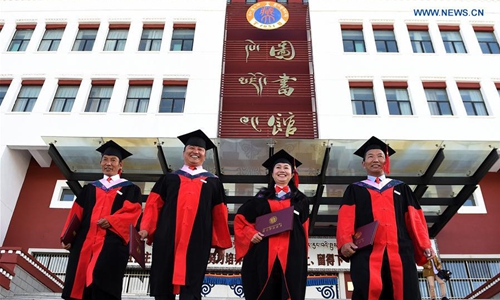
Four PhD graduates are seen after a graduation ceremony at Tibet University in Lhasa, southwest China's Tibet Autonomous Region. Photo: Xinhua
Northeastern University in Northeast China's Liaoning Province said it will dismiss 52 PhD students who failed to finish their studies within the permitted study period. One of them has been studying for their PhD for 18 years and another two for 17 years, according to an announcement released by the university's College of Information Science and Engineering on Tuesday.
The students were enrolled by the college from 2002 to 2012, a list on the college's official website showed. About 78 percent of them have been studying for their PhD at the college for over a decade.
The study period for doctoral students in the university is three years, however, and the maximum length of schooling is six years with suspensions included, according to the management rules of the university.
Chinese universities have been seen clearing those postgraduate or PhD students who fail to graduate at the correct time in recent years. Xidian University in Xi'an of Northwest China's Shaanxi Province, for example, dismissed 33 PhD students in August, some of whom had been studying for 15 years.
Yanbian University in Northeast China's Jilin Province announced on November 29, 2019, that it would dismiss 136 graduate students, including 14 PhD students.
A staff member of the university said that some of the students left without telling the school or going through the correct procedures, Changjiang Daily reported.
The difficulties in PhD study and the improving requirements for academic achievements (such as completing a PhD) have been found to be the main reasons resulting in students dropping out, experts said.
A professor at a Shanghai-based university, also a PhD tutor, who asked not to be named, told the Global Times that the main reasons for some PhD students failing to graduate are that they cannot meet the academic requirements of their chosen schools, including publishing a certain number of studies on academic journals, completing course credits, and finishing and having their doctorate dissertations approved.
"In addition, many schools generally have improved their academic requirements for doctoral students in recent years, making it difficult to finish a PhD," the professor noted, adding that PhD students at his school also need to attend international-level academic meetings, in addition to publishing academic papers and having their final thesis reviewed by experts from other schools.
This was echoed by Yang Liu, an associate professor who graduated with a PhD four years ago from a key university in Shanghai, who told the Global Times that it is not strange for some PhD students to drop out under the strict academic review process.
Some students studying science may fail to finish their studies due to a lack of data caused by insufficient experimental equipment in some schools, Yang noted.
He also said that some may be scared off by the economic pressure of long-term schooling.
"Studying a PhD requires a huge amount of reading, writing, thinking and surveying, which is totally different from college and postgraduate levels. One needs to be fully prepared psychologically and competent enough academically to finish their studies," Yang said.

